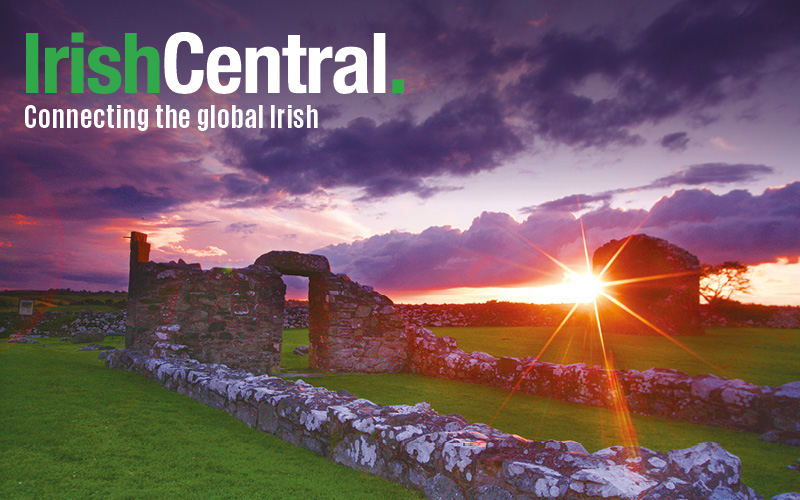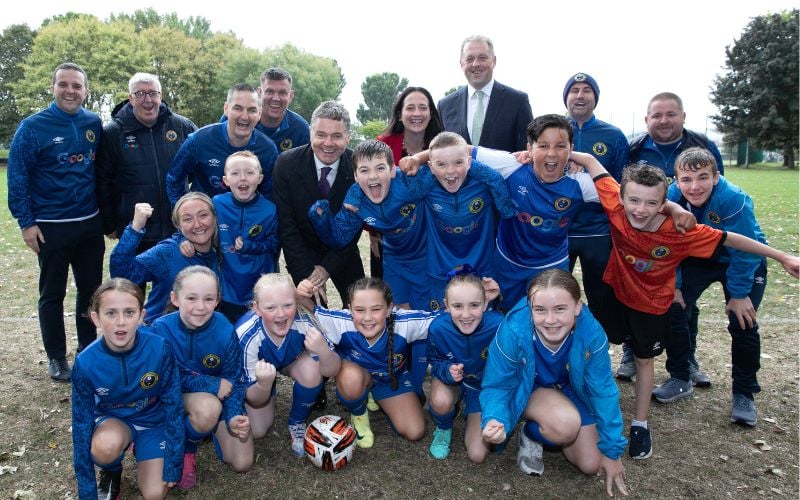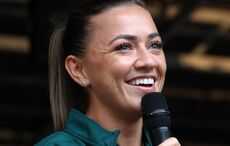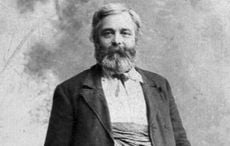If you drive across the mountain road that borders south Dublin, chances are you will see Padraig Harrington at work in the garden that serves as his office.
Out the back of a modest but large dwelling he has installed a kidney-shaped green built to U.S. PGA specifications, two artificial putting greens, six small target greens, three bunkers filled with different sorts of sand, and teeing areas where he can hit a golf ball with everything from a three-iron to a sand wedge in the direction of Wicklow. The harder he practices the luckier he gets, as Gary Player used to say.
Happily married to Caroline and with a brother or sister on the way, for young son Paddy, Harrington is the finest Irish golfer of his generation, the first Irish winner of the British Open in 60 years, and the man who brought a country to a standstill to watch his play-off victory over Spanish sensation Sergio Garcia at Carnoustie, Scotland in July.
Yet he still works hard at his game because he believes he has to.
“Talent will only get you so far – the successful ones are the ones who work harder,” he says.
Harrington was born in Dublin in August 1971, and born to golf. By the age of four, Padraig was playing golf and chasing rabbits in Stackstown, the course his father and fellow members of the Garda Siochana (the Irish police force), built on the side of the mountains that straddle Dublin’s border with Wicklow.
Golf was big in the Rathfarnham home he shared with brothers Tadhg, Fergal, Colm and Fintan, as were football and hurling. His father Paddy, a Cork man, played Gaelic football in the 1957 and 1958 All-Ireland football finals.
“Whenever I go to Cork I am still regarded as Paddy’s son, not as a sportsman in my own right,” he laughs.
Padraig, too, played football and hurling, but when he was picked for the Irish Boys Golf Team when he was 15, he gave up football and life as a goalkeeper.
He had much success as an amateur golfer. Victories in the 1995 Irish Amateur Open and the Irish Close Championship, and three Walker Cup appearances against the United States saw him ranked number one in Ireland. But instead of turning pro, Padraig went to college to study accountancy. His intention was to work as a golf club manager, or maybe on the player management side of things.
“I never thought of myself as a pro at that time because I didn’t think I was good enough,” he says simply. “I wanted to be in the golf industry, but I never thought I would be an actual player. It was only at 21 years of age that I decided to turn pro, purely because the guys I was able to beat as an amateur were turning pro, not because I thought I was good enough.
“The idea was to have a couple of years on the tour if I could. But I started out so well – it was fairy tale stuff. They gave me a check for playing golf the first week I was on tour. I remember calling home and telling my folks, ‘This is great.’ Then, in 1996, I won the Spanish Open after just ten weeks on tour, so I just kept going.”
A year later, however, the 1997 U.S. Open Championship at the Congressional Country Club, in Bethesda, Maryland, pulled him up short.
“It was just too difficult for me,” he recalls. “I couldn’t get around a golf course like that. I shot 76, 77 and came home thinking, well, I’m a good golfer, but that’s really not enough unless I do something about it.
“It was then that I started working with Bob Torrance [the legendary Scottish coach, father of former Ryder Cup captain Sam Torrance], and since then I’ve worked tirelessly to improve my game so that I could compete on U.S. style golf courses.”
The hard work paid off. By the end of 2006, Harrington was Europe’s number one and a four-time Ryder Cup hero for Team Europe. As well as that heart-stopping play-off win over Sergio Garcia in the British Open at Carnoustie – after twice going into water on the 18th hole in regulation play – Harrington also became the first Irishman in 25 years to win the Irish Open championship with
another play-off victory, this time over Welshman Bradley Dredge, at Adare Manor, County Limerick, back in May.
When I talked to Harrington, now just past his 36th birthday, he was still on a high from winning the British Open.
“There are times when I look around the house to see where the Claret Jug is at. It might be on the mantlepiece or on the breakfast table, but it’s there and it’s mine.
“I’ve got the Open trophy. It will change my life, but will it change my personality? I hope not.
“There is ego involved with golf but the way I was brought up I would never want to show that,” says Harrington.
“I am tough inside, there is no way I would be playing this game if I wasn’t, but you don’t need to be arrogant to be good at the game. What you do need is a certain selfconfidence,” he adds.
To the uninitiated, Harrington’s emergence as the top golfer in Europe looks natural, but those who know him best know how hard he has worked on his game since the 1997 experience at the U.S. Open convinced him he needed to totally rebuild his swing.
“I’ve worked to improve my game so that I could compete on U.S. style golf courses, but winning the British Open [Carnoustie is a links course] was definitely down to my instincts for playing links golf as an amateur growing up,” he says.
As hard as he had worked on his game, Harrington still had to find the confidence to win.
“It’s been a long road. I don’t know if I ever believed I was going to do it, but I tried, especially that week at Carnoustie, to convince myself. Carnoustie was hard work. I didn’t feel as good about my game as I did about the U.S. Open last year, where I felt I had a genuine chance of winning and I was feeling comfortable about it, but I stuck to my guns and just kept playing golf.
“I’m not a glamorous player but I work hard, and sometimes that’s what it takes,” he adds. “I take a lot of comfort from Michael Jordan’s basketball career, because he was a late bloomer. I have done much better than I ever imagined, and there is no point in stopping now. I have to keep doing what I’ve been doing and fine tune the rest.”
Family is everything to Padraig Harrington. Son Paddy is nearly four years of age. A brother or sister will arrive in November, an early Christmas present for the affable Dubliner and his wife Caroline, the girl by his side since he summoned up the courage to ask her out to a Patrick Swayze movie, six months after he first set eyes on her, when her father brought her to watch a junior game at Stackstown.
“When you shoot a bad score, the only people who care are your wife, your family and your dog,” he says. “If I have a bad day, I can get it off my chest quickly by talking to Caroline. Then we move on. We don’t sit around moping. We go out and that time is hers and ours. But the talking is important. She is a good psychologist. The best for me, anyway. Golf is a terrible game that way. It builds up inside you, and it is best to get it out. She is there for me when things go wrong – and when I need a kick up the backside.”
Young Paddy was on the practice green as Padraig waited for the play-off that would change his life. Every time his dad hit a putt, Paddy kicked the ball away with a grin on his face as wide as the Firth of Forth, which runs alongside this famous course.
“I knew then that Padraig would win,” his sports psychologist Bob Rotella revealed afterwards. “To look at him with his son at his feet, preparing for the biggest play-off of his life, I just knew this was a man ready to win.”
Son and father were united again when Harrington dispatched the putt that dispatched Garcia on that 18th green less than an hour later. “Daddy, can I put ladybirds in it?” asked the bairn, as the Claret Jug found Irish hands for the first time since Fred Daly triumphed at Royal Liverpool back in 1947.
“I’ve had to rescue a few ladybirds on their way into the trophy back home in Dublin,” reveals Harrington. “When we’re out in the back garden of our house we often collect ladybirds and stick them in a jar, so the natural thing for Paddy is to want to house them in the Claret Jug,” he laughs, adding, “but if they went in there they’d be intoxicated with all the alcohol that’s passed through it in the last month. Everyone has wanted to drink from the Open trophy! I think it’s better for the ladybirds if we don’t put them in there.”
His own father, Paddy, was close to Harrington’s heart on that day in Carnoustie as well. The newly crowned British Open champion shed a couple of tears as he paid tribute to his dad, who lost his battle with cancer two years ago.
“When you are on the course, you have to become detached from your emotions, or you won’t focus and you won’t compete. You have to be careful or you can get sidetracked. My father was very important to my career. If I had started to think of him then I wouldn’t have played any golf, but I was emotional afterwards when I thought of what that win would have meant to him,” Harrington reveals.
“That was why, when I did the interview afterwards, I could hardly speak. I had convinced myself I would win but I hadn’t prepared myself for the emotional part of winning. It was such a high, and I was thinking of my dad. It would have been very, very special for him, but I would have been a quivering wreck for the last couple of holes if I had started thinking of what my winning would have meant to him.”
Harrington doesn’t drink and he doesn’t smoke. The night he won the Open, he partied until four in the morning at a small house near the course that he shared with wife Caroline and son Paddy, his caddy, Ronan Flood and his wife, who just happens to be Caroline’s sister. They were up till four, whooping and hollering with the best of them, but barely a drop of the creatur touched Harrington’s lips. “The first thing that was sipped out of the jug was Johnny Smith’s Smooth Bitter [beer] and that was because of a promise to somebody at the start of the week who was drinking the same. I said, ‘Well I’ll have one of those if I win the Open.’ So that’s how that got in there.
And then it was champagne. After that there was a mixture of stuff put in there. At this stage if you smelt the inside of that Claret Jug you wouldn’t want to drink out of it,” he confirms. Bed at four and up at six. “I couldn’t sleep,” Harrington says. “At six that morning I was awake, bright as a button, and looking at the Claret Jug at the bottom of the bed. I woke Caroline, pointed at the trophy and said, ‘I just won the Open Championship.’ She said, ‘that’s very good, well done,’ and then she told me to go back to sleep, but I couldn’t.”
A private jet flew Harrington home to the Weston Aerodrome just outside Lucan in West Dublin. He popped in to a party thrown in his honor by close friend Dermot Desmond, and then went back to his Stackstown roots for the mother of all celebrations at the golf club his late father helped to build. “The reaction at home was, and is, incredible,” he admits.
“The two things that struck me were the amount of people who watched the Open who had never watched golf before, and the amount of men who told me that they cried when I won.
“It’s been phenomenal. There is no other nation like Ireland to get behind their sports people, and there’s no question that the support has helped me along the way,” he adds. “And the bookmakers paid out over $10 million. What more can you ask for?”
Away from the golf course, Padraig Harrington is a man of simple tastes. His den at home includes an authentic 50s jukebox, a pool table and enough arcade games to keep a grown child happy. A night out with Caroline generally includes a movie and popcorn. “I’m not one for the arthouse movies. I’m into what I call a good popcorn movie, where you can sit back in the seat and just immerse yourself in the movie with a big bucket of popcorn by your side,” he laughs.
Dinner tables are invariably livelier when Harrington is around. “I’ve always been one for a good argument,” he admits. “It’s probably my favorite pastime. I love to try to change someone’s mind. It’s not that I think I’m always right. If you tell me the sky is royal blue, I’ll say, ‘No, it’s azure blue.’ I’d argue that with you for ten minutes. Then the next guy will come along and tell me the sky is azure blue, I’ll say, ‘No. It’s royal blue.’ My opinions change to suit the occasion. I can always see the other side of the argument. So I’ll argue the other way to make everyone else do the same.
“I’ve never traveled with the pack. I never wanted to. I didn’t smoke or drink at school. Peer pressure never made me do something I didn’t want to do. I got on with everyone at school from the hard lads to the nerds, but I was never going to be in either camp. I always wanted to be different.” With career winnings topping $25 million, Harrington already has more money than he ever dreamed of, so winning his first major isn’t going to change him.
“More money isn’t going to make me happy,” declared Harrington. “We make so much money as professional golfers these days, that it is not an issue for me at all. There is a temptation to cash in, but it would be fair to say that I want to win more majors, more than money. I just want to play golf and I don’t want to jeopardize that.”
The one luxury Harrington will now consider is a private jet – but only to make his life easier. “There’s nothing else that I want in my life, materially. I don’t need anything else. I have a ten-year-old car. I bought a new one last year, put 2,000 miles on it and got rid of it. Even the 10-year-old car only has 22,000 miles on it!”
So what does the future hold for Padraig Harrington? “You won’t catch me playing on the Seniors Tour at 50. I’ll be burnt out by then,” he laughs. “If I wasn’t a golfer I’d love to have been a coach. I could see myself in 20 years coaching Paddy’s Gaelic football team rather than playing on the Seniors Tour. Even when I’m watching the Dubs in Croker [Dublin plays in Croke Park] I’m not watching like a fan. I’m trying to figure out what’s going on behind the scenes, what they do for training, and what’s in their head. When I met up with my cousin Joey, who’s a professional American footballer [Joey Harrington is the starting quarterback for the Atlanta Falcons], we always get to talking about training. I’m more interested in that than anything else. I love the idea of telling someone something they don’t know and showing them how to do it right.”
As we go to press, Harrington is immersed in the Fed Ex Cup campaign in the U.S. He will be home in time for the birth of his second child in November, home to enjoy his greatest Christmas yet.
“I will be in a good mood for the next year or 10 years or even forever with this,” he admits, but he is still getting used to being the Open champion. “In those reflective moments when I’m alone, I sit back and think ‘I can’t believe I’ve done it.’”
He did. And he has the Claret Jug to prove it, ladybirds and all.




Comments